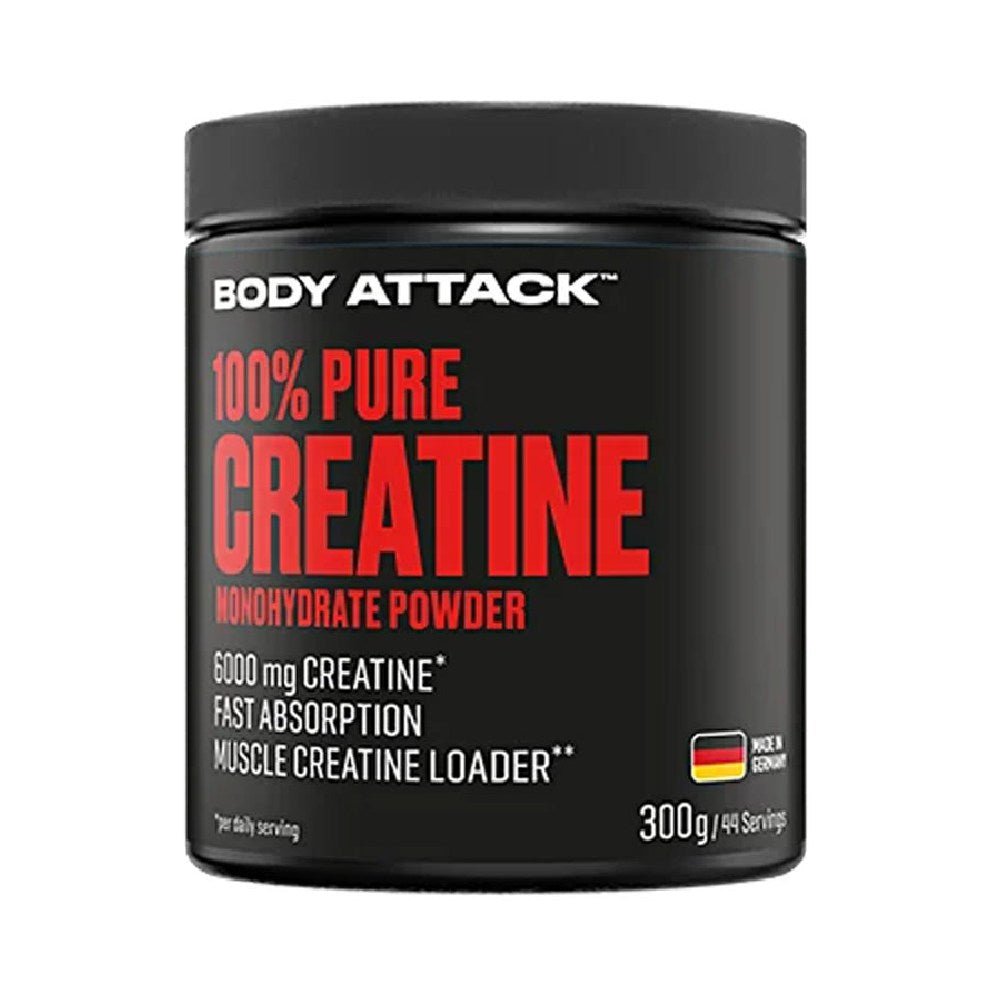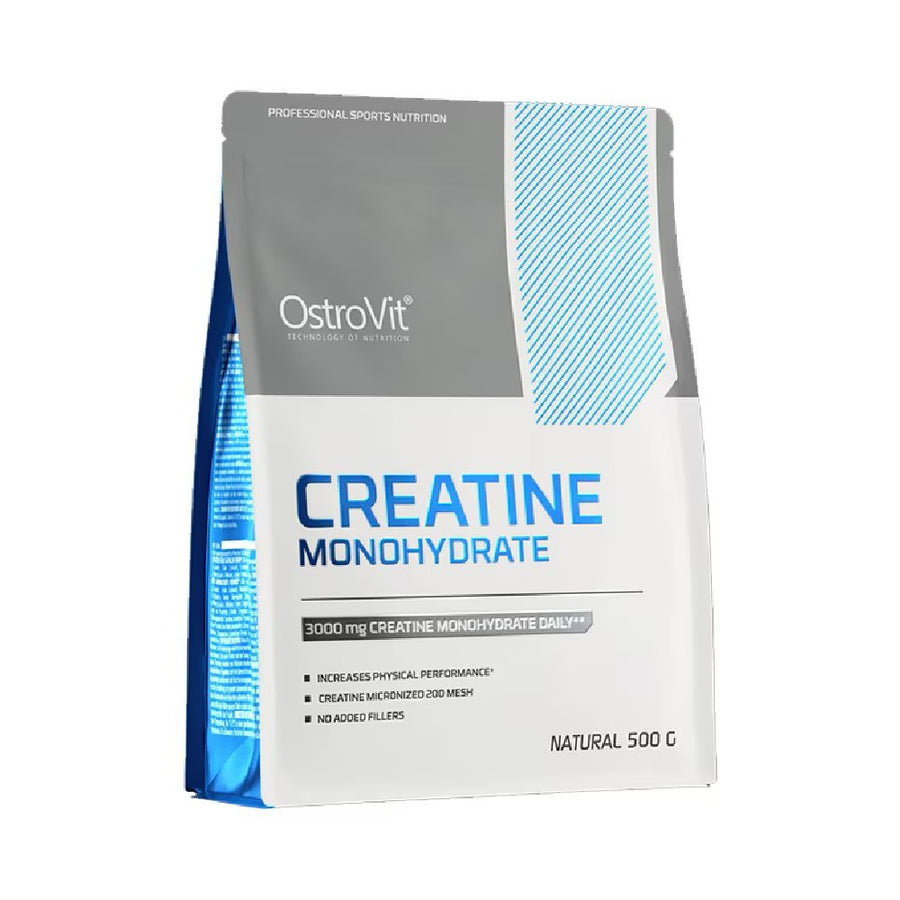What is creatine monohydrate and how can it improve your athletic performance? ⚡

Creatine monohydrate is a supplement for increasing strength and muscle mass. It is among the most studied, and if you want to get more power in your workouts and streamline your recovery periods, this supplement could be the ideal solution.
In the following lines, which we invite you to read, you will learn more useful details about creatine monohydrate, its mode of action and the correct administration of these supplements for athletes.
-
✅ Creatine monohydrate is the purest and most effective form of creatine, supporting the production of ATP - the main source of muscle energy.
-
✅ Increases strength and endurance during high-intensity workouts, such as weightlifting and sprints or HIIT (High Intensity Interval Training) workouts.
-
✅ Accelerates muscle recovery and reduces the feeling of fatigue after training.
-
✅ Contributes to muscle mass growth by attracting water into muscle cells and stimulating protein synthesis.
-
✅ The optimal dosage is 3-5 g per day, and for quick results, a loading phase can also be used.
🔍 What is creatine monohydrate and how does it work?
Creatine is a natural compound found in muscles, synthesized from arginine, glycine and methionine. Its main role is to help produce ATP (adenosine triphosphate), the energy source used in intense and explosive exercise.
🔹 Creatine monohydrate is the most studied and effective form of creatine, with high bioavailability and an optimal ratio between efficiency and price.
🔹 Improves athletic performance by increasing muscle phosphocreatine reserves and providing more energy for muscle contractions.
🏋️♂️ The proven benefits of creatine monohydrate
Creatine not only improves short-term performance, but also has a positive impact on long-term muscle growth. It works through several mechanisms:
📌 It increases muscle strength and power and is ideal for sports such as powerlifting, bodybuilding and sprinting.
📌 Improves anaerobic performance, being beneficial for high-intensity workouts.
📌 Accelerates recovery, reduces muscle inflammation and prevents catabolism.
📌 Increases muscle volume. By retaining water in the muscles, creatine improves their volume, providing a full and firm appearance.
📌Increase protein synthesis. Creatine can stimulate cell signaling that regulates protein synthesis, promoting muscle fiber repair and growth.
📌Reducing catabolism. Creatine can help reduce muscle protein breakdown (catabolism), which is essential for supporting muscle growth and recovery.
Creatine is a particularly effective supplement for anaerobic sports. This includes activities that require short bursts of energy, such as sprinting, weightlifting, or strength training. While creatine can be useful for lower-intensity aerobic exercise (such as long-distance running), its benefits are much more apparent in anaerobic activities.
⚖️ Types of Creatine: Why is Creatine Monohydrate the Best? 🏆
There are several types of creatine on the market, but creatine monohydrate remains the gold standard due to its proven effectiveness.
🔬 Creatine monohydrate vs. other forms of creatine
🔹 Creatine monohydrate – The best studied, effective and affordable.
🔹 Creatine HCL – It dissolves more easily in water, but does not offer superior benefits to monohydrate.
🔹 Creatine ethyl ester – Poorer absorption, low efficiency.
🔹 Kre-Alkalyn Creatine – Claims to have superior absorption, but studies do not confirm its superiority over monohydrate.
🔹 Micronized creatine monohydrate is an improved version, with smaller particles for better solubility.
🕒 How to take creatine monohydrate correctly?
There are several popular methods of administering creatine monohydrate. Here is a review of the methods recommended by sports nutrition specialists:
🚀 Charging phase (for quick effects)
📌 5-7 days: 20 g/day divided into 4 doses (5 g per dose).
📌 After loading: 3-5 g/day to maintain creatine levels.
This method allows muscles to quickly replenish their creatine reserves, accelerating the benefits.
⏳ Standard dosage (without loading phase)
📌 3-5 g/day, administered daily, regardless of training.
This method brings the same benefits, but over a longer period of time (approximately 3-4 weeks).
Creatine monohydrate is generally considered safe for long-term use as long as it is taken at recommended doses. Some athletes choose to take a break from creatine for a few months to prevent any minor side effects, but there is no solid evidence that continued use is harmful for most healthy people.
🍽️ When and with what to take creatine monohydrate?
📌 After training - Creatine is better absorbed with fast carbohydrates (e.g. dextrose, bananas).
📌 In the morning, on rest days – To maintain optimal creatine levels.
Creatine can be combined very well with other supplements to improve overall performance:
Beta-alanine: Helps reduce muscle acidity and relieves muscle fatigue. The combination of beta-alanine and creatine can increase strength and endurance during intense exercise.
Whey protein: After training, a protein shake can help with recovery and muscle growth, especially if combined with creatine to stimulate protein synthesis.
Caffeine: Another popular supplement that can provide an energy boost and support performance during high-intensity workouts. Some studies suggest that taking creatine along with caffeine can improve performance during sprinting exercises.
🔹 Hydrate properly – Creatine attracts water to your muscles, so consume enough water daily.
❗ Myths about creatine monohydrate 🧐
🔹 Does creatine affect the kidneys? – No, in healthy people. Long-term studies have not shown any negative effects.
🔹 Does it cause water retention? – Only at the muscular level, which improves performance.
🔹 Do you need to take breaks? – It is not necessary, as long as you follow the recommended dosage.
Creatine monohydrate is one of the most effective supplements for strength, power, and muscle growth. If you want more energy and faster recovery, this supplement is worth including in your routine.
Although creatine is more commonly associated with anaerobic sports, there is also evidence that it may benefit endurance athletes. In this case, creatine may help improve recovery and reduce the risk of muscle fatigue, especially during periods of intense training or multiple competitions.
In conclusion, creatine monohydrate is one of the most effective and affordable supplements for increasing physical performance and stimulating muscle growth. If your goal is to improve your strength, recovery, and muscle size, creatine can be an essential tool in your training routine.
Photo source: shutterstock.com


















